"Frontiers of Biology", a Liberal Arts and Sciences Course newly organized by Professors Kiyokazu Agata and Yoshiko Takahashi of the Graduate School of Science, concluded on 23 July after presenting lectures by 26 prominent researchers working at the forefront of their fields. The course was primarily intended for newly enrolled undergraduates, featuring lecturers such as Professor Shinya Yamanaka, Director of the Center for iPS Cell Research and Application (CiRA), Professor Shin-ichi Nakano, Director of the Center for Ecological Research, and Professor Yoshio Koyanagi, Director of the Institute for Virus Research, as well as President Juichi Yamagiwa.
Upon the course's conclusion, Professor Agata, one of the coordinators, released the following statement sharing his thoughts on the project.
How well did "Frontiers of Biology" do?
Professor Kiyokazu Agata, Graduate School of Science
The "Frontiers of Biology" course was conceived as a fresh initiative, spearheading comprehensive reform of Kyoto University's arts and sciences curriculum as planned by the Institute for Liberal Arts and Sciences (ILAS) for implementation in 2016.
Our primary goal with the course was to introduce newly enrolled undergraduates to the rich learning experiences available at the University in the form of stimulating lectures -- ones that would be unlike anything they would have experienced at high school. We wanted to demonstrate to those students that lectures could be exciting and could introduce them to topics they would want to actively investigate. We sought to avoid having the students regard the lectures as something to be endured in order to meet credit requirements. On the first day, I called on those in attendance to keep an eye out for anything arousing their curiosity, warning them that attending classes merely for the sake of earning credits would be excruciatingly boring. This concern was shared by many among the KU faculty, including President Yamagiwa and Professor Yamanaka -- hence the amazing lineup of lecturers we were able to pull together.
On each Thursday class day, two lectures were held during the third and fourth periods for a total of 28 lecturers for the entire course. Professor Takahashi (3rd period) and I (4th) acted as coordinators, with Professors Ryoichiro Kageyama (3rd) and Tadashi Uemura (4th) sub-coordinating.
Attendance was consistently high, as the students, including many from Faculties not related to biology, apparently took great joy in participating.
Each lecturer kept the talks short enough to allow for 15 minutes of Q&A. As we had hoped, many of the attendees fearlessly and inquisitively took advantage of this opportunity, helping create an atmosphere of engagement and participation in the lecture hall, which we count among the key accomplishments of our initiative.
It was truly gratifying to note that everyone seemed to delight in the experience, whether they were speaking or listening to others, with smiles on their faces that convinced me that the two years of hard work put into organizing and coordinating the course (with much help from many of the ILAS faculty members) had not been in vain. It is my sincere hope that our initiative will help transform student perceptions of our campus-wide arts and sciences curriculum initiative.
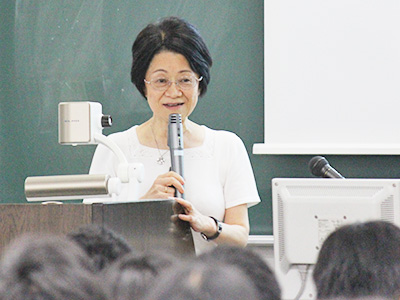
Executive Vice-President Kayo Inaba, recipient of the 2014 L'Oréal-UNESCO Award for Women in Science, lecturing on "Investigating natural immunity"
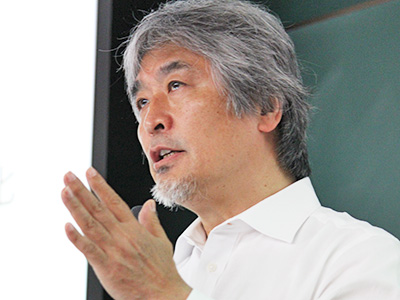
President Yamagiwa lecturing on "Elucidating the evolution of humanity based on observations of primate behavior"
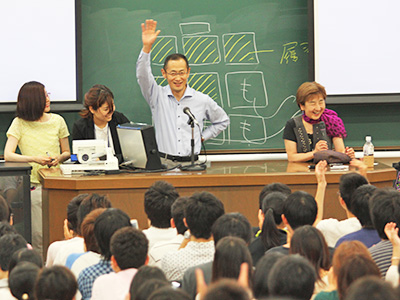
CiRA Director Yamanaka, 2012 recipient of the Nobel Prize in Physiology or Medicine, discussing "Regenerative medicine and the creation of iPS cells"
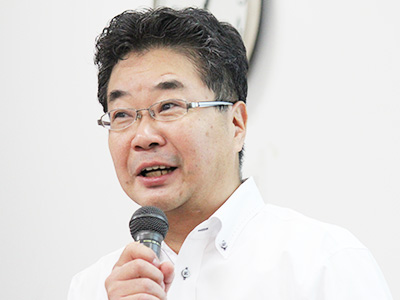
Professor Kazutoshi Mori of the Graduate School of Science, co-recipient of the 2014 Albert Lasker Award for Basic Medical Research, lecturing on the "Cellular response involved in protein quality control"
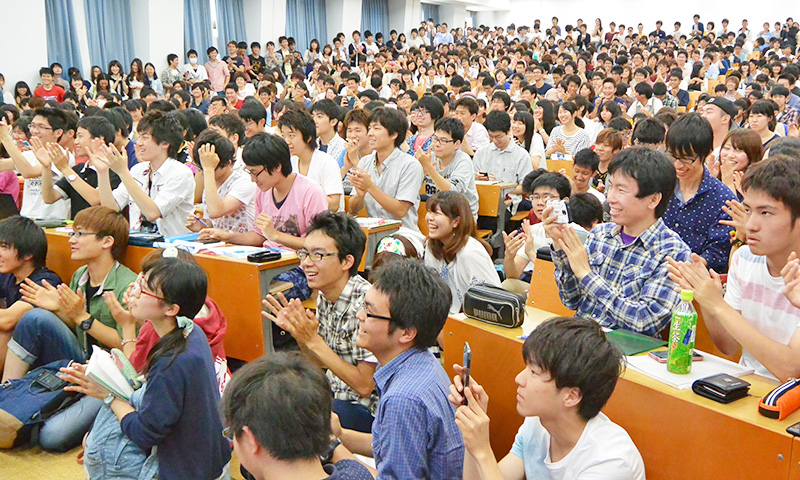
Students attending one of the lectures





